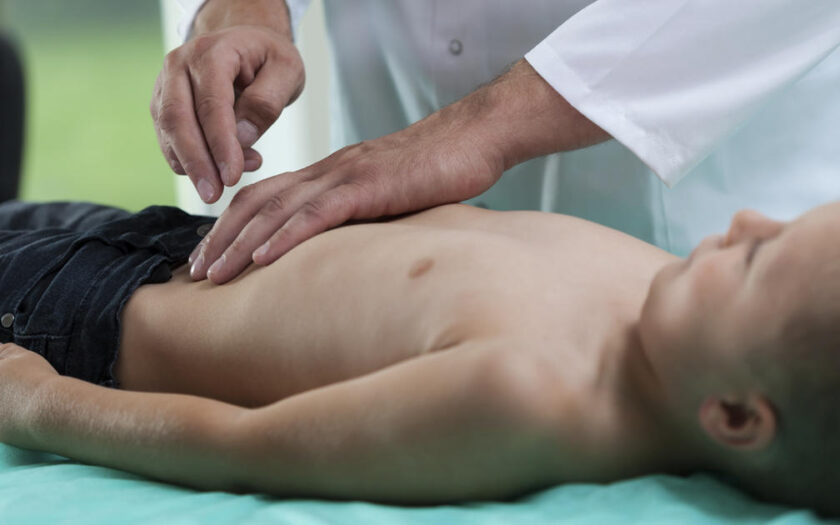Appendicitis is one of the most common causes of emergency abdominal surgery in kids and teens. This condition occurs when the appendix becomes inflamed, leading to symptoms like abdominal pain, nausea, and fever. Early diagnosis is crucial to prevent complications such as a ruptured appendix, which can be life-threatening. Understanding the signs and seeking prompt medical care can make a significant difference in outcomes.
What Is Appendicitis?
Appendicitis occurs when the appendix becomes blocked and infected. The appendix is a small organ attached to the large intestine, located in the lower right side of the abdomen.
Appendicitis is a medical emergency, and it’s important to recognize the symptoms. If your child shows any signs, seek immediate medical attention.
What Causes Appendicitis?
Appendicitis happens when the appendix gets blocked, allowing bacteria to grow inside. Some common causes of blockage include:
- Hard stool (feces)
- Swollen lymph nodes in the intestines
- Parasites or other infections
Appendicitis typically affects children and teens between the ages of 5 and 20. It’s rare in infants and is not contagious, meaning it cannot be spread from one person to another.
What Are the Signs & Symptoms of Appendicitis?
Early symptoms of appendicitis often include mild fever and pain near the belly button that can feel like a regular stomachache. However, with appendicitis, the pain worsens and moves to the lower right side of the abdomen.
If your child complains of belly pain, watch for these additional symptoms:
- Intense pain around the belly button or lower right abdomen (pain may start off mild and become more severe and constant)
- Low fever
- Loss of appetite
- Nausea and vomiting
- Diarrhea, often in small amounts with mucus
- Swollen or bloated belly
A burst appendix can cause more serious symptoms, such as a high fever (up to 104°F/40°C). This requires immediate medical attention.
If you suspect appendicitis, contact your doctor right away. Early detection makes treatment easier and more effective.
Complications of Appendicitis
If untreated, appendicitis can lead to a ruptured appendix, allowing bacteria to spread throughout the body. This can cause complications such as:
- An abscess (a collection of pus)
- A widespread infection in the abdomen, known as peritonitis
How Is Appendicitis Diagnosed?
Diagnosing appendicitis can be challenging because its symptoms resemble other conditions like gastroenteritis, kidney stones, or urinary tract infections.
To determine if your child has appendicitis, the doctor will:
- Examine the abdomen for pain and tenderness
- Perform blood tests and urine tests
- Order imaging tests like X-rays, ultrasound, CAT scan, or MRI
If appendicitis is suspected, your child may be advised to avoid food and drinks in case surgery is needed.
How Is Appendicitis Treated?
Surgical Treatment (Appendectomy)
In most cases, the treatment for appendicitis is an appendectomy, where the appendix is surgically removed. Surgeons often use a laparoscope (a small instrument) to remove the appendix through three small incisions. Many children go home the same day, while others may stay longer depending on the situation.
Before surgery, doctors will give your child IV fluids and antibiotics to prevent infection. Pain medication is provided as needed after surgery.
While surgery carries some risks, such as infection or bleeding, appendectomies are a common and generally safe procedure for treating appendicitis.
Non-Operative Treatment (Antibiotics)
In some cases of early or mild appendicitis, doctors may choose to treat the condition with antibiotics alone, allowing children to avoid surgery. This approach, known as non-operative treatment, begins with IV antibiotics in the hospital, followed by a course of oral antibiotics at home for seven days.
However, if the child doesn’t improve with antibiotics or if appendicitis returns, surgery will still be necessary. Non-operative treatment can also be used for children with a ruptured appendix, where antibiotics treat the infection before the appendix is removed later.
Your care team will discuss the treatment options, along with their benefits, risks, and possible side effects (such as diarrhea from antibiotics or interference with medications like oral contraceptives).
What Else Should I Know?
There’s no way to prevent appendicitis, but with prompt medical attention, doctors can usually diagnose and treat it effectively, avoiding major complications.



